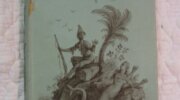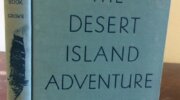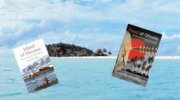
Desert Island Books: Chibundu Onuzo
Chibundu Onuzo, a Nigerian author, shares her selection of books that have had a profound impact on her life. These books have not only inspired her writing but have also shaped her perspective on the world. If she were stranded on a desert island, these would be the books she would want to have with her.
One of the books that Onuzo holds dear is “Things Fall Apart” by Chinua Achebe. This seminal novel tells the story of Okonkwo, a Nigerian man striving to maintain traditional values in the face of colonialism. Onuzo praises Achebe for his masterful storytelling and for giving a voice to those who were silenced by history.
Another book that has had a profound impact on Onuzo is “Beloved” by Toni Morrison. This powerful and haunting novel explores the experience of slavery and its enduring impact on individuals and communities. Onuzo admires Morrison’s ability to delve deep into the complexities of the human condition and bring them to life on the page.
Onuzo also credits “Americanah” by Chimamanda Ngozi Adichie as a book that has shaped her life. This novel follows the story of Ifemelu, a young Nigerian woman navigating race, identity, and love in America. Onuzo praises Adichie for her keen observations and sharp wit, as well as her ability to address important social issues in a nuanced and engaging way.
These are just a few of the books that have left a lasting impression on Chibundu Onuzo. Each of these works has not only influenced her as a writer but also as a person. They have challenged her to think differently, explore new perspectives, and engage with the world around her. For Onuzo, these books are not just stories on a page, but windows into different worlds and opportunities for growth and self-reflection.
Desert Island Books: Chibundu Onuzo
In the deserted island scenario, one can easily imagine Chibundu Onuzo, a Nigerian author, seeking solace in books. As a writer whose life has been shaped by literature, it is no surprise that books would be her anchor on a desert island.
Onuzo’s journey as a writer began with the book “Purple Hibiscus” by Chimamanda Ngozi Adichie. This powerful coming-of-age story captivated her young mind and inspired her own storytelling. The themes of family, religion, and personal growth resonated deeply with Onuzo, setting her on a path of literary exploration.
The next book that left a lasting imprint on Onuzo’s life was “Things Fall Apart” by Chinua Achebe. This classic Nigerian novel delves into the complexities of culture clash and colonialism. Onuzo was drawn to Achebe’s ability to portray the nuance and depth of Nigerian society, and she credits this book with shaping her understanding of her own country’s history and identity.
As a writer hailing from Nigeria, Onuzo also draws inspiration from the works of Nigerian playwright Wole Soyinka. His play “Death and the King’s Horseman” is a powerful exploration of tradition, honor, and the clash between African and Western values. Onuzo admires Soyinka’s ability to tackle weighty subjects with wit and humanity, and she finds his work to be a constant source of inspiration.
Lastly, Onuzo cites “Americanah” by Chimamanda Ngozi Adichie as a book that has shaped her life. This novel explores themes of race, identity, and the immigrant experience, and Onuzo, herself having studied in the United Kingdom, found many parallels with her own life. Adichie’s powerful storytelling and social commentary have deeply influenced Onuzo’s writing, pushing her to explore similar themes in her own work.
On a desert island, books would be Chibundu Onuzo’s lifeline. These literary works have shaped her writing and her understanding of her own identity and culture, making them essential companions in her solitary island existence.
The Books that Shaped a Nigerian Author’s Life
Chibundu Onuzo, a renowned Nigerian author, has had her life greatly influenced by the power of books. From her early childhood, books played a crucial role in shaping her perspective, igniting her imagination, and inspiring her creativity.
One of the books that left a profound impact on Chibundu Onuzo was “Desert”, a gripping novel written by her favorite author. Through its vivid descriptions of the harsh desert landscape and compelling characters, this book transported Onuzo to a different world and instilled in her a deep appreciation for the power of storytelling.
As Onuzo grew older, she discovered other literary works that continued to shape her life. She was particularly drawn to books that explored the complexities of Nigerian society and challenged prevailing norms. These books, often written by Nigerian authors, gave her a deeper understanding of her own culture and heritage, while also exposing her to new perspectives and ideas.
Onuzo was also profoundly influenced by books that delved into themes of identity, belonging, and displacement. These stories resonated with her personal experiences as a Nigerian living in a rapidly changing world. They allowed her to reflect on her own journey and find solace in the shared struggles and triumphs of others.
Today, Chibundu Onuzo continues to be an avid reader and writer, drawing inspiration from a wide range of books and authors. She believes that books have the power to shape not only individuals, but also societies, and that reading is a transformative act that can bridge divides and foster a greater sense of empathy and understanding.
Childhood Adventures and Imaginations
As a child growing up in Nigeria, Chibundu Onuzo often found herself transported to different worlds through the books she read. The pages of these books were her desert island, providing an escape from reality and fueling her imagination.
Onuzo’s love for books began at a young age, with her parents introducing her to a wide range of literature. She would spend hours lost in the words and stories, diving into imaginative adventures that took her far away from her everyday life on the island. The books she read became her companions, teaching her about different cultures, traditions, and ways of life.
Books like “Robinson Crusoe” by Daniel Defoe would inspire Onuzo’s own fantasies of survival on a desert island. She would imagine herself navigating the challenges of isolation, creating her own world and finding solace in nature. These stories awakened her sense of adventure and expanded her understanding of the possibilities that existed beyond her immediate surroundings.
Onuzo’s childhood adventures were not limited to physical islands; they extended into the realms of fantasy and magic. Books like “Harry Potter” by J.K. Rowling transported her to Hogwarts School of Witchcraft and Wizardry, where she could be a part of a fantastical world filled with spells, potions, and mythical creatures.
Through her love for books, Onuzo discovered that the desert island of her imagination had no boundaries. It became a place of endless possibilities, where she could embark on incredible journeys, explore new ideas, and experience emotions she had never felt before. These childhood adventures shaped her as a writer, influencing her own storytelling and fueling her passion for literature.
Discovering African Literature
In the vast sea of literature, there is an island rich with the voices of African authors. Chibundu Onuzo, a Nigerian writer, has been shaped by the books she discovered on this literary desert island. These books, written by African authors, have provided a window into the diverse cultures, histories, and experiences of the continent.
Chibundu Onuzo’s journey into African literature began with the works of Chinua Achebe, a pioneer of African literature. His novel “Things Fall Apart” opened her eyes to the complexities of Nigerian society and the effects of colonialism. Through Achebe’s powerful storytelling, Onuzo discovered the importance of representation and the ability of literature to challenge and reshape narratives.
As Onuzo delved deeper into African literature, she encountered the works of Nigerian author Buchi Emecheta. Emecheta’s novel “The Joys of Motherhood” explored the struggles and sacrifices of women in a patriarchal society. This book resonated deeply with Onuzo, highlighting the power of storytelling to shed light on the experiences of marginalized voices.
In her exploration of African literature, Onuzo also discovered the works of Chimamanda Ngozi Adichie. Adichie’s novel “Half of a Yellow Sun” provided a glimpse into the Nigerian-Biafran war and its impact on the lives of ordinary people. Through Adichie’s vivid storytelling, Onuzo gained a deeper understanding of Nigerian history and the resilience of the human spirit.
Onuzo’s journey through the African literary landscape has been a transformative one. Through these books, she has discovered her own voice as a writer and the power of storytelling to bridge gaps and foster understanding. The books she found on this literary desert island have not only shaped her as an author, but also opened her eyes to the beauty and complexity of African literature.
The Richness of Nigerian Fiction
Nigerian fiction is a treasure trove of stories and experiences that have captivated readers around the world. Chibundu Onuzo, a prominent Nigerian author, acknowledges the significance of Nigerian literature in her own development as a writer. She credits the books she encountered on the desert island of Nigerian fiction as instrumental in shaping her worldview and literary style.
One of the remarkable aspects of Nigerian fiction is its diversity. Nigerian authors explore a wide range of themes, from political and social issues to personal stories of love and self-discovery. This diversity reflects the multicultural and multilingual nature of Nigerian society, with over 250 ethnic groups and numerous indigenous languages. It is this rich tapestry of cultures that infuses Nigerian fiction with its unique flavor.
Furthermore, Nigerian fiction is characterized by its potent storytelling. The narratives often have a strong oral tradition and incorporate elements of folklore and mythology. These stories are passed down from generation to generation and form an integral part of Nigerian identity. Such storytelling traditions are evident in the works of authors like Chinua Achebe, Buchi Emecheta, and Chimamanda Ngozi Adichie, who have become literary icons and ambassadors of Nigerian literature.
The prominence of Nigerian fiction on the global literary stage is also a testament to its richness. Nigerian authors have received numerous accolades and awards, with works such as “Half of a Yellow Sun” by Chimamanda Ngozi Adichie and “Things Fall Apart” by Chinua Achebe gaining international recognition. These novels have not only entertained readers but also shed light on Nigeria’s history, culture, and social issues, fostering a greater understanding of the country and its people.
In conclusion, the richness of Nigerian fiction lies in its diversity, potent storytelling, and global impact. Chibundu Onuzo’s experience on the desert island of Nigerian books is a testament to the power of this genre, which continues to captivate readers and shape the literary landscape in Nigeria and beyond.
Exploring Stories of Identity
In her collection of desert island books, Nigerian author Chibundu Onuzo explores stories that delve into the complex theme of identity. By choosing these books, she showcases the importance of understanding and questioning one’s own identity.
One of the books Chibundu Onuzo selects is “Americanah” by Chimamanda Ngozi Adichie. This novel follows a Nigerian woman living in the United States and explores the challenges she faces as she navigates the complexities of race, immigration, and belonging. The story highlights the notion of identity as a fluid concept that is shaped by interactions with different cultures.
Another book that resonates with Chibundu Onuzo is “Half of a Yellow Sun” by Chimamanda Ngozi Adichie. Set during the Nigerian-Biafran War, the novel examines how identity is shaped by political and social circumstances. It delves into the themes of nationalism, ethnic identity, and the impact of conflict on individual and collective identities.
Chibundu Onuzo’s choice of “Things Fall Apart” by Chinua Achebe further explores the theme of identity in her desert island book list. This iconic novel tells the story of Okonkwo, a respected Igbo warrior, and his struggles to maintain his cultural identity amidst the intrusion of colonialism. It raises questions about the influence of external forces on individual and cultural identities.
By including these books in her desert island collection, Chibundu Onuzo demonstrates a deep appreciation for narratives that delve into the complex nature of identity. Through these stories, she invites readers to question and reflect upon their own identity and the factors that shape it.
Inspiring Historical Narratives
Chibundu Onuzo, a Nigerian author, shares her love for inspiring historical narratives. These books have shaped her life and influenced her writing. Historical narratives transport us to different times and places, allowing us to immerse ourselves in their stories and gain a deeper understanding of the past.
One of the books that has had a profound impact on Chibundu’s life is “Island of the Lost: Shipwrecked at the Edge of the World” by Joan Druett. This thrilling true story recounts the harrowing experiences of shipwreck survivors on a remote island in the South Pacific. It showcases the resilience and ingenuity of the human spirit, inspiring readers to never lose hope even in the most challenging circumstances.
Another book that has left a lasting impression on Chibundu is “Desert Queen: The Extraordinary Life of Gertrude Bell” by Janet Wallach. This biography explores the remarkable life of Gertrude Bell, an influential British explorer and diplomat in the early 20th century. Bell’s adventures in the Middle East and her pivotal role in shaping the region’s political landscape make for a fascinating and inspiring read.
Chibundu also highlights “The Bookseller of Kabul” by Åsne Seierstad as a book that has influenced her. This non-fiction work takes readers on a journey into the lives of a family in Afghanistan, providing a unique perspective on the country’s complex history and culture. It serves as a powerful reminder of the resilience and strength of individuals, even in the face of adversity.
Overall, these inspiring historical narratives have captivated Chibundu Onuzo and enriched her understanding of the world. They showcase the power of storytelling to connect us with the past, inspire us to overcome challenges, and foster empathy and understanding for different cultures and experiences.
The Impact of Books on Historical Understanding
In the context of desert island books, Chibundu Onuzo, a Nigerian author, reflects on the books that have shaped her life. One area where books have had a profound impact is on her historical understanding. Through the exploration of historical narratives, Onuzo has been able to deepen her knowledge of the past and gain insights into the complexities of different eras.
Books provide a window into history, allowing readers to immerse themselves in different time periods and gain a more nuanced understanding of events and their impact. They offer a platform for authors to provide unique perspectives and challenge mainstream historical accounts. Onuzo has found that this exposure to varying viewpoints has broadened her own historical understanding and made her question previously held assumptions.
A key aspect of historical understanding that books have helped Onuzo develop is empathy. Through reading about different historical moments, she has been able to empathize with the struggles and triumphs of those who came before her. This empathy has allowed her to connect with history on a deeper level and appreciate the significance of individual stories within the broader historical context.
Books also play a crucial role in preserving and disseminating historical knowledge. They serve as repositories of information, ensuring that historical events and their significance are not forgotten. Onuzo acknowledges the importance of this role and the responsibility authors have in accurately portraying history. Through her own writing, she strives to contribute to the preservation of historical knowledge and the sharing of diverse historical perspectives.
In conclusion, books have had a profound impact on Chibundu Onuzo’s historical understanding. They have provided her with a platform to explore different historical narratives, challenge mainstream accounts, develop empathy, and contribute to the preservation of historical knowledge. As she reflects on the books that have shaped her life, Onuzo recognizes the power of literature in deepening one’s understanding of the past and its relevance to the present.
Journeying through Different Genres
Chibundu Onuzo, author of “The Spider King’s Daughter,” shares the books that have shaped her life, as she imagines being stranded on a desert island. One of the greatest joys of reading is the ability to explore different genres, and Onuzo’s list reflects her diverse literary tastes.
First on Onuzo’s list is “Jane Eyre” by Charlotte Bronte. This classic novel is a timeless tale of love, independence, and societal expectations. Onuzo admires the strength and resilience of the protagonist, Jane, as she navigates through various hardships with determination.
Next, Onuzo includes “Midnight’s Children” by Salman Rushdie. This magical realism masterpiece explores themes of identity, nationhood, and the consequences of historical events. Onuzo is captivated by Rushdie’s ingenious storytelling and his ability to blend history and fiction.
Onuzo ventures into the realm of crime fiction with her next choice, “The Secret History” by Donna Tartt. This gripping novel follows a group of eccentric students who are entangled in a murder mystery. Onuzo is drawn to Tartt’s atmospheric writing style and the complex web of secrets that the characters unravel.
For a lighter read, Onuzo selects “Bridget Jones’s Diary” by Helen Fielding. This humorous contemporary novel follows the misadventures of Bridget Jones as she navigates through love, career, and self-discovery. Onuzo appreciates the relatable and hilarious portrayal of Bridget’s everyday struggles.
Finally, Onuzo includes “Things Fall Apart” by Chinua Achebe, a groundbreaking novel that explores the clash between African tradition and colonialism. Onuzo admires Achebe’s ability to depict the complexities of Nigerian society, and how the protagonist, Okonkwo, grapples with the changing world around him.

All these books have left a profound impact on Onuzo’s writing and have helped shape her own literary style. Whether it’s the exploration of love and societal expectations, the blending of reality and fantasy, or the portrayal of complex characters, these books have enriched Onuzo’s understanding of storytelling and her connection with readers.
The Power of Science Fiction and Fantasy
In her list of desert island books, Nigerian author Chibundu Onuzo includes several works of science fiction and fantasy. This choice highlights the power of these genres to captivate and inspire readers, regardless of their cultural background.
Science fiction and fantasy have the unique ability to transport readers to other worlds, whether those worlds are filled with advanced technology and space exploration or magical creatures and mythical realms. These genres allow us to imagine the unimaginable and explore the limits of human imagination.
For Chibundu Onuzo, science fiction and fantasy provided an escape from reality and a way to explore deeper themes and ideas. These genres often tackle complex social, political, and philosophical issues in a metaphorical and imaginative way. By using otherworldly settings and characters, authors can comment on real-world problems and challenge readers to think outside the box.
The power of science fiction and fantasy lies in their ability to push boundaries and challenge societal norms. By presenting readers with alternative realities and possibilities, these genres can inspire individuals to question the status quo and imagine a better future. Whether it’s through exploring racial inequality, environmental destruction, or the limits of human potential, science fiction and fantasy have the power to spark important conversations and drive social change.
Chibundu Onuzo’s inclusion of science fiction and fantasy in her list of desert island books is a testament to the enduring impact of these genres. They offer not only entertainment and escapism but also a way to explore complex ideas and challenge our understanding of the world. Whether you are stranded on a desert island or simply seeking inspiration, science fiction and fantasy can provide a portal to new worlds and thought-provoking narratives.
Unforgettable Characters and Relationships
Chibundu Onuzo, a Nigerian author, reflects on the books that have shaped her life and left an indelible mark on her as a writer. She shares that one of the aspects she finds most compelling about these books is the unforgettable characters and relationships they portray.
From her desert island selection of books, Onuzo highlights the power of well-written characters who stay with the reader long after the book is finished. These characters are complex, multidimensional, and relatable, making them incredibly compelling.
Onuzo emphasizes that it is not only the main characters who leave a lasting impression, but also the relationships they form throughout the story. The interactions and dynamics between characters in the books she chooses are intricately woven and add depth to the narrative.
Through her reading experience, Onuzo has come to appreciate the importance of strong character development and the impact it has on the overall storytelling. She recognizes that memorable characters and relationships are the driving force behind many of her favorite books, and they continue to inspire her own writing journey.
Exploring Global Literature
Chibundu Onuzo’s desert island books are a testament to the powerful impact of global literature. Through her selection, Onuzo showcases the diverse voices and perspectives that can be found in books from all corners of the world.
As a Nigerian author, Onuzo’s appreciation for global literature is evident in her choices. From the classic works of authors like Chinua Achebe and Wole Soyinka to modern gems like Zadie Smith’s “White Teeth,” her selection represents a rich tapestry of global storytelling.
The books chosen by Onuzo not only span different cultures and continents but also explore a wide range of themes. From personal experiences of migration and belonging to political struggles and social justice, these books offer readers a deeper understanding of the world we live in.
Through her love for global literature, Onuzo encourages readers to step outside their comfort zones and explore new perspectives. She highlights the power of literature to challenge preconceived notions and open minds to different ways of thinking.
By celebrating the diverse voices and stories found in global literature, Onuzo reminds us that reading is not only a personal journey but also a way to connect with others and bridge cultural divides.
Books That Break Cultural Boundaries
In Chibundu Onuzo’s desert island books selection, she highlights the power of literature to break cultural boundaries and offer new perspectives. These books open up worlds beyond our own, challenging preconceived notions and expanding our understanding of different cultures.
One of the books that Onuzo includes is “Americanah” by Chimamanda Ngozi Adichie. This novel tells the story of a young Nigerian woman who moves to the United States, navigating the complexities of race, identity, and love. Through the protagonist’s experiences, Adichie breaks cultural boundaries and sheds light on the immigrant experience.
Another book on Onuzo’s list is “Half of a Yellow Sun” by Chimamanda Ngozi Adichie. Set during the Nigerian-Biafran War, this novel explores the impact of conflict on individuals and families. Adichie’s vivid storytelling and rich characters break cultural boundaries by immersing readers in a historical and cultural context that may be unfamiliar to them.
“I Do Not Come to You by Chance” by Adaobi Tricia Nwaubani is another literary work that breaks cultural boundaries. This novel delves into the world of email scams in Nigeria, giving readers a glimpse into the lives of those involved and challenging stereotypes surrounding the country. Nwaubani’s humorous and thought-provoking narrative offers a fresh perspective on a global issue.
Onuzo’s desert island books demonstrate the power of literature to transcend cultural boundaries and foster understanding between different societies. By exploring diverse experiences and perspectives, these books encourage readers to question their own assumptions and bridge the gaps between cultures.
Contemporary Voices
In the literary world, contemporary voices play a vital role in shaping the literary landscape. Chibundu Onuzo, a Nigerian author, is one such voice that has emerged from the desert island of literature to captivate readers with her unique storytelling.
Onuzo’s novels, such as “The Spider King’s Daughter” and “Welcome to Lagos,” showcase her ability to explore complex themes and present diverse characters. Through her writing, she brings to life the realities of Nigerian society, addressing issues such as corruption, poverty, and political unrest. Her strong and authentic voice resonates with readers, providing a fresh perspective on contemporary Nigerian life.
Onuzo’s work has been praised for its engaging prose and compelling narratives, which effortlessly blend elements of family, love, and identity. Her ability to portray multifaceted characters with depth and humanity adds to the richness of her storytelling. Through her narratives, she creates a sense of connection between her readers and the diverse experiences of her characters, fostering empathy and understanding.
As a young author, Onuzo represents the new generation of Nigerian writers who are reshaping the literary landscape. Her voice, both distinctive and refreshing, adds to the chorus of contemporary voices from around the world. In an era where representation and diversity are increasingly valued, Onuzo’s work stands out as a testament to the power of storytelling to bridge gaps and build connections.
Through her novels, Chibundu Onuzo invites readers to delve into the complexities of Nigerian society, offering a window into a world that is both familiar and foreign. Her unique perspective and insightful storytelling make her a contemporary voice that deserves to be heard.
Unlocking the World of Non-Fiction
Chibundu Onuzo’s book choices reflect her diverse literary tastes, but she also acknowledges the importance of non-fiction books in shaping her perspective and understanding of the world. Non-fiction offers a wealth of knowledge and insight, allowing readers to explore topics they may not have experienced otherwise.
By delving into non-fiction works, Onuzo has found herself immersed in the fascinating world of facts, ideas, and real-life stories. These books have not only expanded her understanding of different subjects but have also inspired her own writing. The desert island scenario presents a unique opportunity to fully immerse herself in the intricacies offered by non-fiction literature.
Non-fiction books have the power to unlock new worlds and perspectives, allowing readers to explore everything from history and science to memoirs and biographies. Through these works, readers gain a deeper understanding of the human experience and the world around them. Onuzo recognizes the value of non-fiction in broadening her horizons and providing a deeper understanding of the human condition.
In addition to fiction, non-fiction books have the ability to challenge readers’ preconceived notions, fostering critical thinking and intellectual growth. They provide a platform for authors to share their expertise and analysis on various topics, giving readers the chance to engage with complex issues in a meaningful way. Onuzo’s desert island book choices showcase her desire to continue learning and experiencing the world through the lens of non-fiction literature.
Books that Offer New Perspectives
Chibundu Onuzo’s selection of books that offer new perspectives is influenced by her experiences growing up in Nigeria. One of the books that has had a profound impact on her is “Island” by Aldous Huxley. This dystopian novel portrays a society on a secluded island where people live in harmony. Onuzo was fascinated by the way Huxley challenged traditional notions of government and social structure, offering a fresh perspective on utopian ideals.
Another book that shaped Onuzo’s worldview is “Desert Flower” by Waris Dirie. This autobiographical work tells the story of Dirie’s escape from a nomadic life in the Somali desert to becoming a successful model. Onuzo was struck by Dirie’s courage and resilience in the face of adversity, and how her story offered a new perspective on the experiences of women in different parts of the world.
“Chibundu Onuzo’s selection of books also includes “The Island of Sea Women” by Lisa See. This historical fiction novel explores the lives of haenyeo, female divers on the Korean island of Jeju. Onuzo was captivated by the way See shed light on a lesser-known culture and the matriarchal society of the haenyeo. The book offered a fresh perspective on the resilience and strength of women through the lens of a unique community.
These books have shaped Chibundu Onuzo’s life as a Nigerian author by broadening her understanding of different cultures, challenging societal norms, and offering new ways of thinking. They have taught her to appreciate the diversity of human experiences and to question the status quo. Through these perspectives, Onuzo has been able to craft her own unique narratives that resonate with readers around the world.
Traveling Through Time and Space
When it comes to exploring new worlds and experiencing different times, books offer us a unique opportunity to travel through time and space. Chibundu Onuzo, a talented Nigerian author, has found solace and inspiration in books, imagining herself on a desert island with a collection of her most cherished literary companions.
From the captivating works of Chinua Achebe to the thought-provoking tales by Chimamanda Ngozi Adichie, Onuzo’s collection would transport her to the diverse landscapes of Nigeria and beyond. These books have the power to teleport her from the bustling cities to the serene rural areas, offering a glimpse into the rich cultural heritage and historical significance of her homeland.
On her hypothetical desert island, Onuzo would also bring along timeless classics like “Pride and Prejudice” by Jane Austen and “To Kill a Mockingbird” by Harper Lee. Through the pages of these novels, she would navigate the societal norms and prejudices of different eras, gaining a deeper understanding of the struggles and triumphs faced by women and marginalized communities.
As she flips through the pages of her cherished books, Onuzo would be able to transcend time and space, immersing herself in different worlds and perspectives. She would find solace in the companionship of fictional characters, allowing their stories to ignite her imagination and enhance her writing.
Books have the power to transport us to places we have never been and introduce us to people we may never meet. As Chibundu Onuzo’s collection demonstrates, they offer a gateway to travel through time and space, expanding our horizons and shaping our understanding of the world.
Books that Inspired Chibundu Onuzo’s Writing
Chibundu Onuzo, a Nigerian author, draws inspiration from various books that have shaped her writing journey. These books have influenced her storytelling, characterization, and exploration of themes.
One of the books that greatly influenced Onuzo is “Desert Island” by Robinson Crusoe. This classic novel ignited her imagination and taught her the art of survival against all odds. Onuzo learned the importance of resilience and resourcefulness from Crusoe’s experience on the deserted island.
Another book that inspired Onuzo is “The Island” by Aldous Huxley. This dystopian novel explores themes of isolation, freedom, and societal structure. Onuzo was captivated by Huxley’s depiction of a utopian society and its underlying flaws. This book encouraged her to delve into complex social dynamics and question the status quo in her own writing.
Onuzo also draws inspiration from “Chibundu” by Chinua Achebe, one of the most renowned Nigerian authors. This novel explores the clash between tradition and modernity in Nigerian society. Onuzo resonated with Achebe’s portrayal of the complexities of Nigerian culture and the struggle to maintain identity in a changing world. This book motivated her to explore similar themes in her own writing and shed light on the cultural nuances of Nigeria.
Additionally, “The Books” by T.S. Eliot has had a profound influence on Onuzo’s writing. This collection of poetry delves into the human condition, spirituality, and the passage of time. Onuzo was inspired by Eliot’s poignant exploration of these themes and incorporated them into her own writing to add depth and substance.
Overall, these books have played a crucial role in shaping Chibundu Onuzo’s writing style and thematic choices. From survival on a desert island to societal critique and the exploration of Nigerian culture, these books have provided her with a rich tapestry of inspiration.
FAQ:
What books influenced Chibundu Onuzo’s life?
Chibundu Onuzo mentioned several books that influenced her life. Some of them include: “Purple Hibiscus” by Chimamanda Ngozi Adichie, “The Color Purple” by Alice Walker, “Things Fall Apart” by Chinua Achebe, and “To Kill a Mockingbird” by Harper Lee.
Why did Chibundu Onuzo choose these books?
Chibundu Onuzo chose these books because they reflected themes and experiences that resonated with her as a Nigerian author. She found inspiration in the storytelling, characters, and cultural representation in these novels.
How did reading these books shape Chibundu Onuzo’s writing?
Reading these books helped Chibundu Onuzo develop her own writing style and voice. They exposed her to different narrative techniques, themes, and perspectives, which she incorporated into her own work. They also influenced her understanding of storytelling and its power to create empathy and connection.
Did Chibundu Onuzo mention any other books that influenced her?
Yes, Chibundu Onuzo mentioned a few other books that influenced her, such as “Jane Eyre” by Charlotte Bronte and “Miguel Street” by V.S. Naipaul. These books also played a role in shaping her as a writer and deepening her love for literature.








